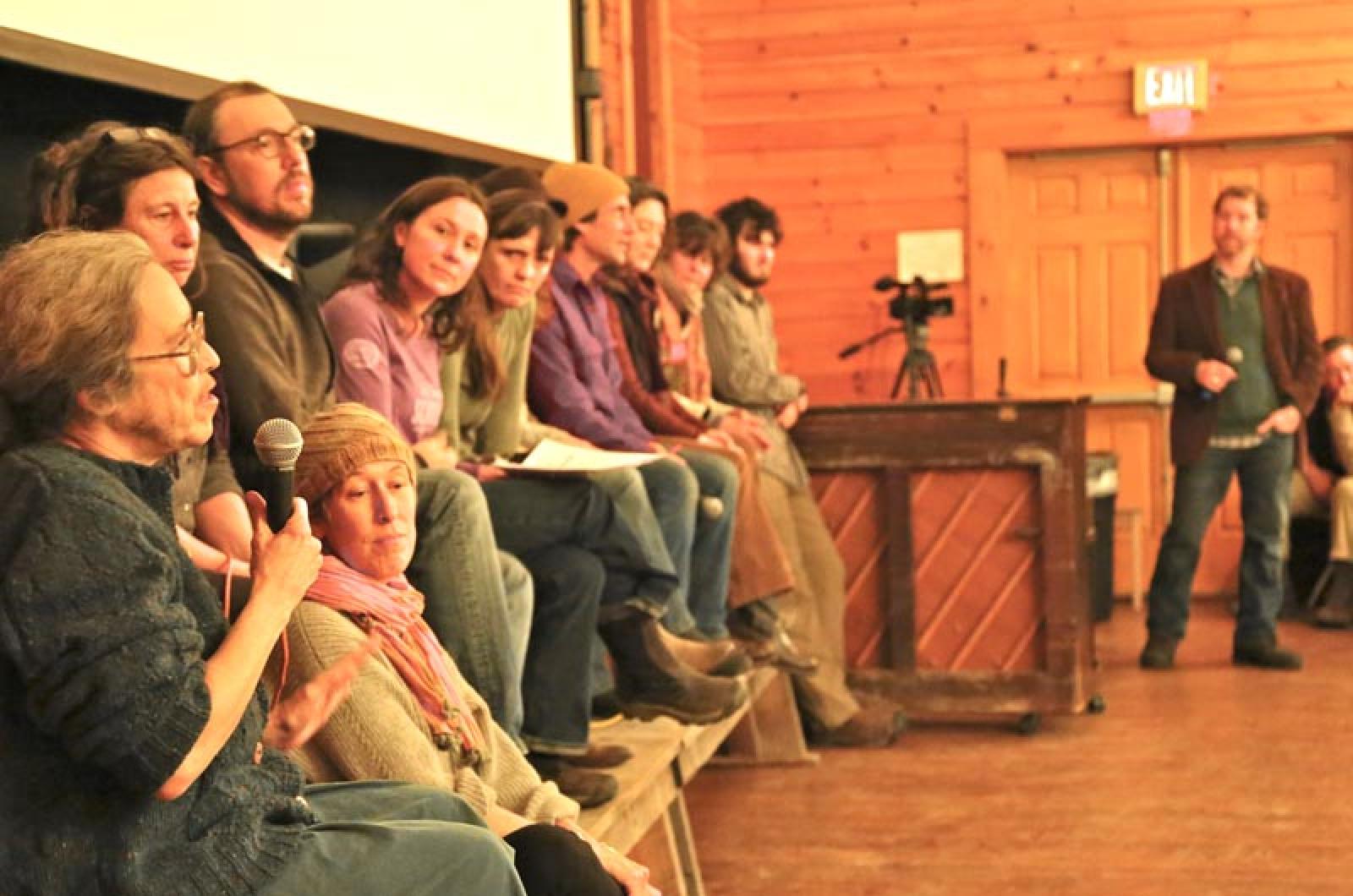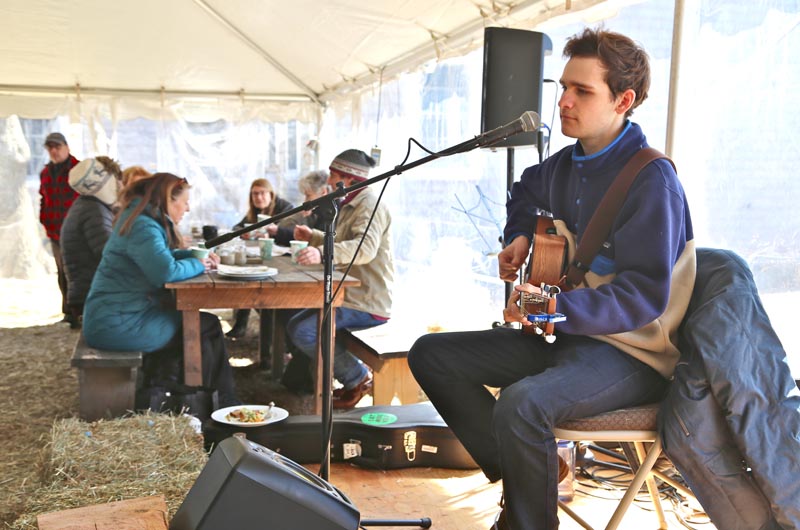The Island was blanketed with a fresh cover of snow Saturday morning as the Martha’s Vineyard Film Festival began its third day of film, food and conversation. At 9 a.m. the first event of the day, a shorts program titled The Future of Farming, welcomed a full house to the Chilmark Community Center, the hardy group undeterred by the snow, sleet and rain that fell outside.
“Doesn’t everyone want to stay in and watch movies in the rain and snow?” said programming director Brian Ditchfield.
Local filmmakers Liz Witham and Ken Wentworth screened their film Sustainable Vineyard: The Story of Seeds as part of the morning program.
“As a filmmaker, the MVFF is a great place to screen your film, especially on topics that are important to our community,” added Ms. Witham.
Following the farming shorts, Mr. Bena invited members of the local farming community to the stage to answer questions from the audience as well as offer their thoughts on the films and the status of farming today. An especially poignant moment for Eric Glasgow of the Grey Barn Farm was seeing a glimpse in one of the films of the Maine farmers who took in Grey Barn’s cows for a year after a fire closed the farm in 2013.
The farming program was just one example of how the festival focuses on bringing films and film subjects to the Island that audience members can both connect to and have conversations with. For most of the films during the four-day festival, directors, actors or subjects became a part of the festival, either by traveling to the Island and leading discussions after the movies and continuing the dialogue informally during meals and gatherings, or by dialing in by Skype. There were also a host of kids programs, from movies to movie-making, to help inspire the next generation of filmmakers.
Several films over the weekend focused on women’s issues including She’s Beautiful When She’s Angry, a documentary that highlights grassroots activism and consciousness raising in the second wave feminist movement.
“We have this wonderful insurgence of young female energy in our office,” explained Mr. Ditchfield as he introduced the film.
Using historical footage and present day interviews with feminist activists, She’s Beautiful When She’s Angry gave a comprehensive overview of the growth of the feminist movement between 1966 and 1971 and was received with laughter, cheers and applause from the audience.
“This is powerful,” said Marjory Potts after the discussion as she reflected on her own experience as a young woman during that time. “I think one of the reasons that people said ‘I’m not a feminist’ is the stridency. Even I thought I want to get somewhere and you don’t get somewhere by screaming. I remember saying I believe in all of these things but I’m not a feminist. I was embarrassed when I saw that, but I also remember why. I want my granddaughter to see it, I want my daughter in law to see this, they don’t know this stuff.”
The Hunting Ground, a present day documentary on the issue of campus rape, screened to a sold out crowd and was followed by a discussion with film subjects and survivors Andrea Pino and Annie Clark. Later that evening, a panel discussion with Ms. Pino, Ms. Clark, Dawn Porter, Vilunya Diskin, Miriam Hawley and Diana Whitten took place at the community center.
“To have young activists learning from these historical figures is such an opportunity to formulate some really cool tactics to change our world,” said programming assistant Cassie Dana.
There were also a number of films screened that were created by Vineyarders. Day 90, a short film by Mara Ditchfield, was shot entirely on the Island and tells the fictional story of a young heroin addict and her struggle to stay clean for 90 days in order to gain permission to visit her daughter.
“I think we need to understand what’s happening and understand the people that it’s happening to,” said Ms. Ditchfield via Skype.
“What advice would you have for high school-aged students who want to create films and write stories as powerful as the ones you produce?“ asked Dan Sharkovitz, an English teacher at the high school.
“Do it as much as you possible can, the more you experiment the more you know,” said Ms. Ditchfield. “Stay true to yourself. The more you practice it the more you understand what that is.”
The program also included two short films by Justin Simpkins and Reece Robinson who both grew up on the Island and have a history of working within the festival.
Mr. Simpkins, 21, said that his goal is to highlight the creative nature of his generation. “What I’m doing with my film work is trying to shed a light on people my age and the amazing things that we’re doing,” he said. “I think there can be some negative perceptions of the millennial generation sometimes and I’m working to show that we are producing really amazing art and entrepreneurship.”
Mr. Robinson’s film uses footage shot both by a digital camera and by a drone, with sweeping views of a car driving on an open stretch of road up-Island.
“There are so many spots on the Vineyard and it’s just as beautiful in the winter, it’s very barren, so we wanted to get that feel,” said Mr. Robinson, who is a freshman at Skidmore College.
The festival ended on Sunday night with the movie Meru, about three elite mountain climbers attempting to scale Mt. Meru, one of the most challenging Himalayan peaks.
And then on Monday morning the staff began breaking down the festival campus. Local farmers stopped by to purchase discounted bales of hay from the dismantled Hay Cafe as Mr. Bena and Mr. Ditchfield took a moment to reflect on the weekend.
Both noted the addition of Skyping with filmmakers and film subjects for post-film discussions and the infusion of young energy in the form of volunteers and filmmakers, as elements that took the festival to another level this year. Above all, though, it was the intimate interactions between film and community that stood out.
“When we say the films spark discussion, debate and action, this year the audience members really stepped up and took action and that’s just a dream come true,” said Mr. Bena. He added that several audience members offered financial support to some of the films’ subjects.
“To actually see it happen over the course of three days in a tangible way was very very powerful.”










Comments (2)
Comments
Comment policy »